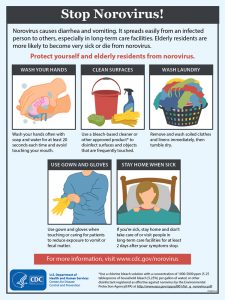As winter approaches, increasing cases of infectious diseases like respiratory infectious disease have been reported globally. In China, the healthcare systems of many provinces remind people to pay attention to infectious diseases that more often occur in winter. These diseases include the flu, chickenpox, scarlet fever, and norovirus gastroenteritis, which can be easily spread from one person to another.
The flu

Imahe/NIAID
The flu is a respiratory infection caused by an influenza virus. It affects people of all ages. Symptoms of the flu resemble that of a common cold but are typically more severe. The most common symptoms include a fever, runny nose, headache, coughing, pain in the muscle or other body parts, and feeling tired. The majority of patients with the flu only experience mild symptoms, and their illness can go away without treatment. However, in some cases, the illness can progress and trigger serious complications such as pneumonia, myocarditis, and encephalitis, which threaten the life of patients. Each year, 290,000 to 650,000 deaths globally are associated with severe complications of the flu. If you experience some of the symptoms mentioned above and they appear to be persistent, go to your doctor for help.
Fortunately, there are vaccines to protect us from the flu. Some health experts recommend people to get a flu shot in mid-October because the flu season generally occurs in winter. However, due to the high mutation rate of flu viruses, flu vaccines are not 100% effective. To protect ourselves from the illness, we need to learn more about its transmission means. Like many other respiratory infectious diseases, the flu is mainly transmitted through small droplets made by infected patients when they cough, sneeze or talk. Therefore, it’s easier for the flu to spread in kindergartens, schools, and other crowded places. During a flu season, schools, kindergartens, and child care centers in some regions of China may be closed for a period of time to slow down the spreading of the flu and provide a chance for them to clean up and make a better environment.
Chickenpox
Chickenpox, or called varicella, is a very contagious illness. The causative agent of the illness is a virus known as the varicella-zoster virus (VZV). Like the flu, chickenpox also occurs more frequently in winter and early spring. Most cases of chickenpox are diagnosed in children at the ages of 1 to 14, and are generally due to school contact. Thus, chickenpox is largely a childhood disease. But it can also affect adults. The disease is characterized by itchy red spots or blisters all over the body. Although rare, serious complications like bacterial infections of the skin, pneumonia, and bleeding problems can occur in people with a weakened immune system, such as infants. It is well-established that VZV is transmitted from person to person via the respiratory route. One can get chickenpox through direct contact with an infected person, through touching contaminated items like clothing from an infected person, or through the air from an infected person’s coughing, sneezing, or talking. You may find that chickenpox and the flu are transmitted in similar ways.
Buy 1 Get 1 FREE CVS Health Vitamins
The chickenpox vaccine is the best way to protect people from the disease. Although the vaccine is generally recommended to be given to infants and children under the age of 13, adults without a history of chickenpox can also get vaccinated. If you are not sure whether you or your children should receive the chickenpox vaccine, you’d better seek help from your doctor or other healthcare providers. For any vaccine, there is a very low risk of an allergic reaction. The primary goal of the treatment of chickenpox is to ease symptoms. Doctors generally treat children and adult patients differently. In the most severe cases, antiviral drugs are prescribed to deal with the disease-causing virus VZV and shorten the duration of the infection. If you get chickenpox, go to see your doctor for help and stay at home to avoid spreading your disease to other people. Drinking plenty of water and having a good rest also help the body fight the disease.
Scarlet fever
Scarlet fever is a bacterial infection triggered by group A Streptococcus (group A Strep or GAS). GAS bacteria are commonly found in the nose, mouth, and throat as well as on the skin of people, and is easily transmitted by inhalation of small droplets made by an infected person or by direct contact with respiratory secretions of an infected person. These bacteria cause a wide variety of diseases in humans, and people with weakened immune systems are more susceptible to these diseases. One such disease is scarlet fever, which often occurs in children between 5 to 15 and is characterized by an upper-body rash, generally following pharyngitis. Other typical symptoms include a sandpaper-like rash, strawberry-like tongue texture, a fever, sore throat, chills, vomiting, and abdominal pain. The majority of all scarlet fever cases are mild. But sometimes the illness leads to serious health problems such as rheumatic fever, kidney disease, and pneumonia.
Soufeel 925 Sterling Silver New Charm Bracelets,Rings,Necklaces Presale, Save Up to 70% OFF
At present, there is no vaccine for prevention of scarlet fever. What we can do to protect us include covering the mouth and nose with a dusk mask, washing the hands frequently, not sharing personal items, and staying away from infected people. Doctors use antibiotics to treat scarlet fever because it’s caused by bacteria. Antibiotics are generally an effective treatment and the use of antibiotics have significantly reduced the death rate of scarlet fever. But the emergence of antibiotic resistance increases the risk of treatment failure. For example, in Hong Kong, China, most strains of GAS bacteria that trigger scarlet fever are resistant to macrolide antibiotics. In fact, antibiotic resistance and misuse or overuse of antibiotics constitute one of the world’s most pressing public health problems.

Norovirus gastroenteritis
Norovirus is a very contagious virus that mainly affects the digestive system. Everyone can be infected by it. It is the leading cause of gastroenteritis in both children and adults. It’s estimated that norovirus is responsible for 685 million cases of acute gastroenteritis every year. Typical symptoms of norovirus gastroenteritis include diarrhea, nausea, and vomiting. The illness is generally mild and of short duration, but can sometimes be fatal, particularly in the young and the old. The outbreaks of norovirus gastroenteritis are more frequent in winter. For this reason, norovirus is also known as the winter vomiting bug.
Despite considerable progress in understanding how norovirus infects humans, there is no vaccine to prevent norovirus infection. People often get infected by eating contaminated foods or drinking contaminated drinks. In closed places such as schools, nursing homes, and cruise ships, norovirus can spread quickly. To prevent norovirus infection, you can wash your hands carefully and frequently, wash fruits and vegetables and cook food thoroughly, wash clothes thoroughly, and clean up the house to make a better indoor environment. Unfortunately, right now there is no specific treatment available for norovirus illness. Management of norovirus illness is mainly focused on alleviating symptoms and avoiding severe complications. For people with norovirus illness, drinking much water to prevent dehydration is of great importance.
In summary, the flu, chickenpox, scarlet fever, and norovirus gastroenteritis are diseases that generally occur more frequently in winter. These diseases only cause a mild illness in the vast majority of cases. But, be cautious that these diseases can lead to severe complications and even kill. Getting a better understanding of these infectious diseases can help you protect yourself and your family from them. Anyway, good health allows you to enjoy your life in winter.
Author bio
Caroline Liu is a writer, focused on topics on life sciences and human health and diseases, and works at Cusabio, a biotech company engaged in the research and manufacture of proteins, antibodies, and Elisa kits.

